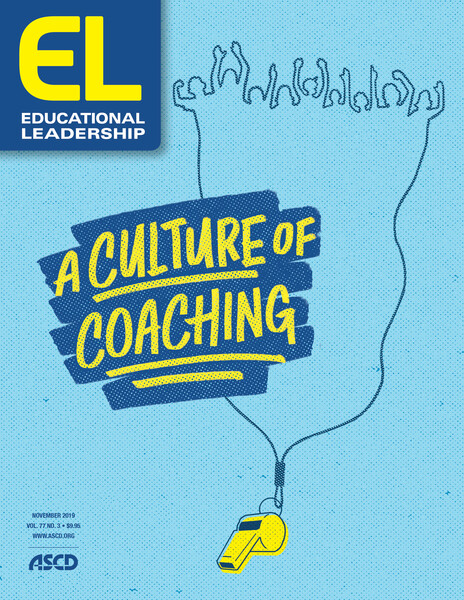Using coaching skills to engage in politically charged conversations.

It's truly a confusing time to be a child. Today's students witness scary images in the news, hear adults speak to each other using the very words children are admonished not to use, and sense the tension and fear projected by their parents. And when they ask trusted adults about all they are taking in, they are often met with blank stares.
The truth is, it's an equally confusing time to be an educator. As members of a profession charged with a duty of care, we too are wincing from shocking accounts about what is happening to fellow humans and to our environment, unnerved by the unexpected speech and actions coming from individuals in powerful positions, and reeling from the amount of change happening in the world—from fluctuating financial markets to new uses of language and technology to shifting assumptions about civility. Even basic civic agreements—including amendments to the U.S. Constitution and the meaning of the poem on the Statue of Liberty—appear to be up for debate.
It's hard to find our own footing in such an environment, much less feel confident and competent to address the questions posed by our students. When we feel there is a risk that our response may be perceived as inadequate at best and inappropriate at worst—making us personally and perhaps even professionally vulnerable—it can feel prudent to take a pass on responding at all.
Fortunately, the professional toolkit of coaching skills that educators bring to supporting students' and adults' learning every day can be a tremendous asset as we courageously take on these conversations.
The emotional spark in today's civic dialogue comes, in part, from the perception that unwritten agreements are being broken. Children shouldn't be taken from their parents, use of four-letter words should be curbed, police will protect the public—these notions are now subject to different perspectives and interpretations. Culturally determined rules, traditions around power, and assumptions about roles guide what we deem to be appropriate actions from others. And when we see people act in ways that we feel are inappropriate for their role, trust is eroded. Many of us don't know what to say, we're not sure who else feels what we do, and as social beings, we want to talk it out.
As educators, we must call upon our superpower—a fierce commitment to students and their learning—to create space for brave dialogue. In this confusing time, we are all looking to make sense of the world around us. If we shy away from emotionally charged conversations with our students or colleagues, we're not only teaching students to do the same, but we're also giving them a reason not to trust us. Creating that space is our role. Coaching moves are our tools.
Skillful coaching conversations create a psychologically safe space for individuals to explore and extend their thinking. When such a conversation is done well, both participants emerge with empathy and a fresh appreciation of differing perspectives. It makes sense, then, that when engaging in dialogue with someone who may hold opposing views or supporting someone to process what he or she views as the unthinkable actions of others, key coaching moves can be invaluable.
1. Asking open-ended questions: We know that in coaching conversations, it's helpful to ask open-ended questions that invite discussion and reflection on the topic without pressure to stake a claim. For example, "How are you feeling about …" is a better initial question than "What do you think about …" because the latter can be received as a request for a stance, while the former helps your partner remain open to nuance, invites her to explore what she thinks, and acknowledges that the issue may be complex. While "how" and "in what ways" are good sentence starters for the beginning of the conversation, "why" questions can come later, to push your partner to analyze the situation after they have described it. A conversation that becomes tense can be diffused with a question that brings you and your partner together in imagining an answer: "I wonder what would happen if …" (Marquant, 2014).
2. Listening attentively: All great teaching requires knowing the learner, so great coaches commit to listening with the intention of learning about the background knowledge, perspectives, and experience their partner brings. They listen attentively and in ways that help the other feel heard, respected, and safe. They notice nonverbal communication, including body language, tone, and emotional cues. One reason we avoid challenging conversations is that we may not know what to say. There is no need, however, to fill silence with more questions or with interjections of one's own interpretations. Coaches allow their learning partners the space to reflect, process, and struggle productively (Cheliotes & Reilly, 2018).
3. Speaking with intention: A coach's commitment to intentional listening should be matched with an equal commitment to intentional speaking. A coach's approach should be one of curiosity and understanding—not debate. When helping the learner see the gap between current performance and the goal, a good coach focuses on the facts and phrases statements with positive intent. This doesn't mean that coaches have to be opinionless. Statements about what you believe and why can help explain how you have interpreted the facts, from the lens of your experience, and surface assumptions on both sides. This conversation, especially when taken in context of your school's explicit community agreements, can lead to an appreciation of different perspectives (Abrams, 2016).
As educators, we claim to embrace the diversity of the students in front of us and aim to tap these differences as assets that can inform our instruction and enrich the classroom. But when it comes to political diversity in our school communities, we too often avoid hard discussions and may even overtly prohibit healthy dialogue. In fact, the basic skills for deepening one's thinking, seeking to surface assumptions, and understanding others' perspectives are right in our wheelhouse. We can build courage for dialogue around challenging issues by leaning on our coaching moves.
From our vantage point in schools, members of the education profession are perfectly positioned to be catalysts for improving the quality of dialogue in the United States. When students or colleagues approach us to have challenging conversations, we owe it to them to be brave and learn together how to talk it out.
References
•
Abrams, J. (2016) Hard conversations unpacked: The whos, the whens, and the what-ifs. Thousand Oaks, CA: Corwin.
•
Cheliotes, L. M. G., & Reilly, M. F. (2018) Coaching conversations: Transforming your school one conversation at a time, 2nd ed. Thousand Oaks, CA: Corwin.
•
Marquant, M. (2014) Leading with questions: How leaders find the right solutions by knowing what to ask, 2nd ed. San Francisco, CA: Jossey-Bass.





